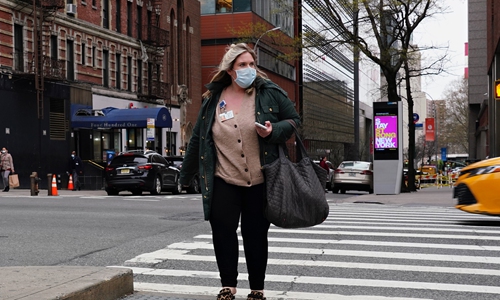Bild editor sells soul attacking China's virus record: Global Times editorial
Source:Global Times Published: 2020/4/20 22:48:40

A medical worker wears a protective mask during the coronavirus pandemic on Friday in New York. Photo: AFP
The coronavirus outbreak is sending shockwaves across the world and triggering various reactions. The anti-virus fight in the US has been quite chaotic. As the presidential election looms large, the Trump team has passed the buck to China by accusing China of concealing the epidemic which led to its losses and used it as a means to shift domestic anger. On the one hand, this seriously violates international ethics, while on the other the behavior has its own logic from the perspective of US domestic politics.It can also be traced to other countries that failed to effectively contain the spread of the virus and ducked responsibilities to China, as they face enormous domestic pressure and feel the need to attack China in coordination with the US government.
Intellectuals and cultural elite in each country are supposed to think independently and stick to morality. They should respect facts and not lend a helping hand to conspiracies.
Bild, Germany's largest newspaper, recently listed a "bill" that China needs to pay for the coronavirus outbreak in Germany. Its editor-in-chief Julian Reichelt also made a video maliciously attacking China. Obviously, he is taking a free ride of US President Donald Trump and finding fault with China.
Chinese public opinion was harsh on the initial handling of the outbreak in the Chinese city of Wuhan, and relevant officials in Hubei and Wuhan were dismissed. The miscalculation in Wuhan was they underestimated the destruction of the virus and downplayed its risks to the public. However, it did not hinder the communication between Chinese and foreign scientists. All data were sent out, including a thesis by Chinese scholars in international academic journals. If the outside world had kept a high alert toward the virus, they could have had their own assessment of the data.
Based on lessons learned from the SARS outbreak, concerns over worse situations in Wuhan rose in mid-January in Hong Kong and other regions. And the worries came mostly from public information from Wuhan.
On January 20, China confirmed human-to-human transmissions of the coronavirus and made it public. Although completing the process was a bit slow, at the global level, the time lost could have been compensated by taking resolute measures. This was especially true for those countries far from China.
Wuhan issued a notice locking down the city in the early hours of January 23, a message so shocking it was like banging the drum in front of all countries, including the US and Germany.
From that day on, China rapidly mobilized. Several big cities one or two thousand kilometers away from Wuhan promptly brought the situation under control. And in only about one virus incubation period, regions outside Wuhan in China had seen a gradual decrease in confirmed cases by February 4.
No case had been reported in Germany by the time Wuhan was locked down, nor had the UK or Italy. France reported its first case on January 25, the first in Europe.
China was the only main battlefield at that time, while the global situation went well. If all countries began to attach importance to the epidemic from January 23, track every confirmed case and close contact and adopt timely quarantine measures, European countries would not be hit by the virus one after another, nor would the US witness thousands of deaths every day.
What was the Bild doing then? What were other European media outlets doing? Why didn't they interview European epidemic prevention experts? Why didn't they sound the alarm to Europeans about the possible outbreak in the continent? Unfortunately, many Western media were criticizing and mocking Wuhan's lockdown and accusing China of violating human rights. To this day, some Western reporters are still expressing negative attitudes toward the lockdown.
Some large Chinese cities, one or two thousand kilometers away from Wuhan, have controlled the deaths of COVID-19 within 100 or even 10. However, in Europe and the US, the epidemic has gone out of control. The total number of deaths in Europe and the US have exceeded 100,000 and 40,000, respectively. Should China be blamed? Is it in line with common sense?
Some people choose to blame it all on China, arguing that if China had initially controlled the epidemic, then it would not have been like this. However, such a complaint is not supported by reason. It has become a topic in the US and Europe because it has been deliberately hyped in a distorted way.
None of the major European countries prevented the initial outbreak of the epidemic, and neither did the US. How many misjudgments and contempt are behind this? Why should Wuhan be specifically blamed by the world when it failed to prevent the virus initially? This is a medieval-style framing. It appears in the West today, which is an evil resurrection.
Those blaming China have unjustified purposes. The Trump administration is for the reelection, and British and Australian officials echoed the US, so as to show the loyalty of the "Five Eyes" to Washington. As for Bild, it obviously wants to be in the limelight in the German media. They are virtually selling their soul.
Judging from Julian Reichelt's fierce remarks during his interview with German media, he has no compassion for the infected patients and deaths. Neither does he have the goodwill to promote global solidarity against the pandemic. All he knows is to intensify opposition between China and the West to hype himself. He is undoubtedly a typical rogue figure in the global intellectual community in this turbulent era. He is a shame of German media.
Posted in: EDITORIAL